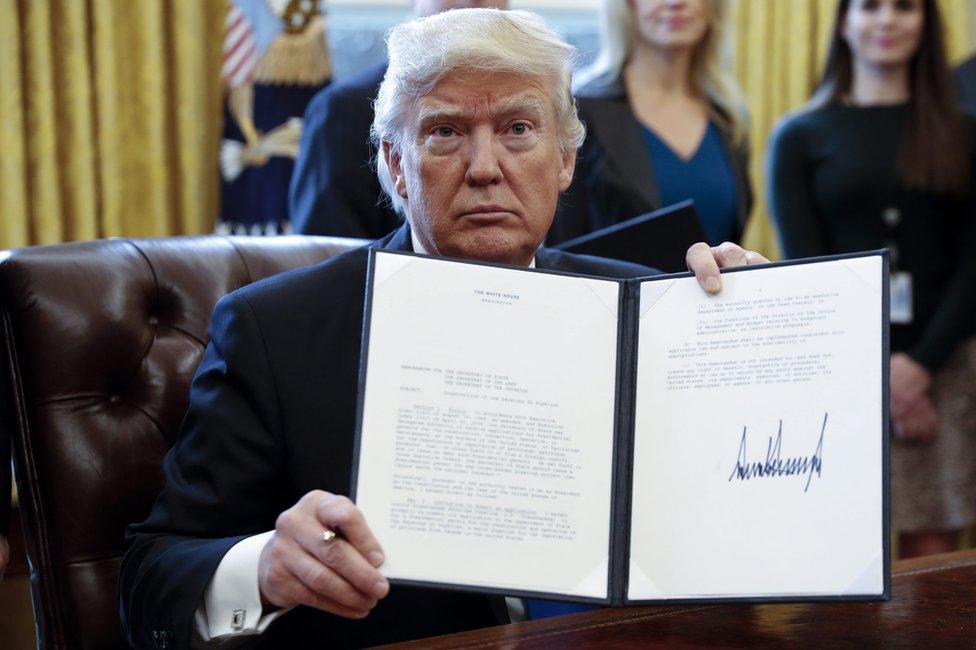President Donald J. Trump has been sworn into office as the 47th President of the United States of America. The inauguration marked a historic presidential administration as Trump is now the second president to serve two non-consecutive terms. He will also hold the record as the oldest president in history to be sworn into office.
The President overcame multiple obstacles during his second campaign for the White House including numerous court hearings and two assassination attempts. During his campaign, President Trump made several large statements regarding what issues he would be targeting upon his entry into the Oval Office. His main focus is the ongoing border crisis and inflation.
On his first day in office, the President signed a wave of executive orders, one of which included an end to birthright citizenship. Currently, under the 14th Amendment, US citizenship is granted to “all persons born or naturalized in the United States” regardless of their parent’s birthplace. The change the President wishes to implement would exclude children whose parents entered the United States illegally. Given that birthright citizenship is guaranteed by the Constitution, the declaration is expected to face legal challenges.
Trump then narrowed his focus on the issue of immigration as he declared a national emergency at the southern border. This action allows Trump to access federal funding to support border security as well as potentially utilize the National Guard and military to be deployed to the border. With so many executive orders directed towards immigrants, many in the country are bracing themselves for what will come in the days to follow.
Mass deportation raids have already been announced to take place within large metropolitan cities such as Los Angeles and Chicago. Within hours of the inauguration, a notice published on the U.S. Customs and Border Protection website said the CBP One app which allows migrants to schedule appointments in advance at eight ports of entry has now been disabled and all existing appointments have since been cancelled.
Additionally, Trump declared Mexican cartels to be classified as foreign terror organizations. After making this declaration, the President was asked about the possibility of sending US special forces into Mexico to combat these organizations. President Trump’s response was simply “Could happen, stranger things have happened.”
Keeping his sights on foreign affairs, Trump issued an executive order to initiate the United States’ withdrawal from the Paris climate agreement, advancing his broad energy agenda aimed at boosting fossil fuel production. The Paris Agreement is a voluntary international pact designed to curb rising global temperatures.
Another executive order established Elon Musk’s Department of Government Efficiency (DOGE). Initially conceived by Musk, DOGE, described as a temporary organization on the White House website, aims to modernize federal technology and software to enhance governmental efficiency and productivity.
Trump also ordered the Department of Justice to seek the death penalty for more defendants. The executive order describes capital punishment as “an essential tool for deterring and punishing those who would commit the most heinous crimes and acts of lethal violence against American citizens.” The crimes noted to be possibly deserving of the death penalty are the murder of a law-enforcement officer, or a capital crime committed by an alien illegally present in this country.
Trump declared a “national energy emergency,” citing inadequacies in multiple factors of the nation’s current energy supply and infrastructure. The order states that these inadequacies caused by “shortsighted policies of the previous administration” are the cause of high energy prices which affect our citizens, primarily low-income families.
Among one of the most controversial actions, the newly appointed President announced that he would be withdrawing the U.S. from the World Health Organization (WHO). The cause for the withdrawal is cited as being due to the organization’s mishandling of the COVID-19 pandemic as well as “inappropriate political influence of WHO member states.”
The withdrawal orders newly appointed Secretary of State, Marco Rubio and the Director of the Office of Management to pause future transfer of US Government funds, support, or resources to the WHO. Other duties listed include recalling and reassigning US Government personnel or contractors working in any capacity with the WHO.
Numerous people have taken to social media to criticize many of the President’s executive orders and some lawsuits have already begun to be filed.
